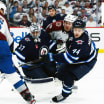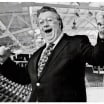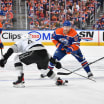OTTAWA -- They were a team without a push, without a purpose, without a pulse. So in the wake of a lower-body injury to Erik Karlsson -- or, at the very least, an exacerbation of an existing injury -- Ottawa Senators coach Guy Boucher and his staff opted to do something relatively controversial down by three goals in Game 4 on Thursday.
He chose to hold Karlsson out for the third period.
He chose to think ahead.
Decision to rest Erik Karlsson pays off for Senators in Game 5 win
Defenseman, who sat out third period in Game 4, responds with three assists against Rangers

That strategic decision, which seemingly goes counter to everything hockey players and coaches and fans hold dear, the play-at-all-costs mentality that drives the sport, paid off on Saturday. It paid off big.
Karlsson was back and as good as ever, the driver in a 5-4 overtime Game 5 win at Canadian Tire Centre that put the Senators one win away from taking the best-of-7 series against the New York Rangers in the Eastern Conference Second Round.
\[RELATED: Complete Senators vs. Rangers series coverage\]
He boosted them. He brought them back from the dead. He delivered the passes and possession and precision few other players can. He was Erik Karlsson again. And that, in large part, goes back to the call made by Boucher and his staff two days earlier.
"As a coach -- and I think, as a coaching staff, because I'm certainly [not] going to take the credit for our decisions, it's a group decision -- we felt that our group was not in the right place for pushback in New York," Boucher said.
"I thought we have a decision to make: We push and we keep pushing the wrong way, or we be smart and we keep the energy and make sure that whatever he had didn't get worse, so that he would have the energy today. That, I think, paid off. He had a terrific game today."
Boucher was right. Karlsson, who played 31:09 after playing 14:54 on Thursday, did have a terrific game. And he said he didn't have any restrictions, any problems, related to what had happened in Game 4. Asked if it was his foot again, which Karlsson revealed during the first round has two hairline fractures, he said, "Can't really say. It's a little bit of everything."
But, he added, there were no serious issues.
"I felt good," said Karlsson, who had three assists. "This time of the year it's always a struggle, not only for me but for everyone. I think that today we came in with a lot of jump and everybody felt like themselves again. This is what we've got to bring with us to New York here on Tuesday."
Karlsson was, as usual, brilliant. He has been brilliant through the regular season, brilliant through the first round of the Stanley Cup Playoffs against the Boston Bruins, brilliant through the first five games of the second round. He seems to get more brilliant by the day, by the game.
In Game 5, Karlsson assisted on the goal by Mike Hoffman at 8:17 of the second period, a tic-tac-toe play from the defenseman to Clarke MacArthur to Hoffman. He added another with 1:26 remaining in the third, a cross-ice pass to MacArthur that set up the pinball puck that bounced off Derick Brassard's skate, off Marc Staal, off Tanner Glass, off Brendan Smith and past goaltender Henrik Lundqvist to tie the game 4-4.
"We expect nothing less," forward Mark Stone said. "He never ceases to amaze. You always expect the best from everybody, but his best keeps getting better. You just kind of shake your head at some of the plays that he makes. That game-tying goal, he makes a huge play for us, probably the only guy on the team that can make it."
His final assist came on the game-winner by Kyle Turris at 6:28 of overtime. Karlsson's pass from behind the home net found Alexandre Burrows, who fed Turris, who scored on the rebound of his initial shot.
The three assists gave Karlsson 10 in 11 Stanley Cup Playoffs games this season, and 11 points overall. Both set Senators records, for most points and assists in a single postseason by a defenseman.
There are more chances to awe and excite, which Karlsson seems to do on a shift-by-shift basis.
"When you've got a player like that, it's hard to say, but you expect it from him," Stone said. "You know when he's on the ice, if you get open, he'll probably find you. He makes plays a step above everybody, like most superstars do."
The decision on Karlsson was similar to one Boucher and his staff made on MacArthur in the same game, to pull back on his minutes in what they deemed a lost game, to save and preserve a player who missed most of the past two seasons.
"I thought it turned into a game where I didn't have to expose him out there," Boucher said of MacArthur. "We made the decision to play him less in the third period and keep the energy for today."
The energy was there. For MacArthur. For Karlsson. For all of the Senators. It was there in the second period after they got down by two goals, as they came back quickly and forcefully. It was there in the third, as they came back again. It was there in the overtime, when they took the win and control of the series back from the Rangers.
It was there for Karlsson, the player most important to the fate of the Senators. And perhaps, in time, he will prove that the decision made by Boucher & Company on Thursday might have been the most important of the playoffs.
















